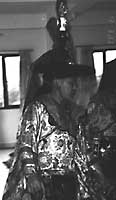|
|
||||
|
The Buddhist practice of confession |
||||
|
Geshe Jangchub Gyaltsen, a buddhist teacher from Ganden Monastery in India, presently resident at the Kunpen Lama Gangchen Centre in Milan, Italy, continues to share the teachings relating to the practice of the Seven Limbs. Following the first limb which consists in prostrations and the second about offerings, we now have the third limb which deals with confessing negative actions. It is interesting to note that the Seven Limbs was one of the main practices of Maitreya who, through sincere practice, attained complete enlightenment. «One must first understand what is negative and what is positive. There are certain negative energies which we accumulate through physical actions, words, thoughts. There are 3 principal negative actions relating to the body, 4 relating to the speech and 3 to the mind: these are killing, stealing, sexual misconduct, lying, slandering, senseless talk, harsh words, committing bad deeds, greed and holding wrong views. In this life, or in previous ones, we have surely committed such negative actions; therefore, there is always a latent negative potential present in us and it is that which must be purified: the more serious the negative action is, the heavier the consequences». «It is important not to accumu-late negative potentials - Geshe continues. No suffering is casual, it depends upon very specific causes: maturation invariably produces suffering. The true enemy therefore is negative energy, negative karma». He underlines: «The first level of knowledge consists in recognising the enemy and being sure not to produce any negative energies. It is important to recognise the fact that negative actions mainly cause damage to ourselves. Once we realise this, it is just as important to be sorry and promise ourselves not to be taken over by our own anger. By reacting calmly, without getting involved with the other’s aggressivity, we brush it away and sooner or later this person will change their attitude. If he or she should persist with being aggressive, we are best to let them stew in their own juice. Once the situation has calmed down, we can try and deal with it once more. Arguing causes damages to both sides. This is the practice of patience». He repeats: «There are 4 antidotes, called ‘opposing powers’, to remove the negative karma accumulated through past actions: the antidote represents the admiration for enlightened beings, the power of repentence, promising oneself not to repeat any negative action and meditation». Geshe Jangchub Gyaltsen ends the teaching on an optimistic note: «There is no such thing as a negative action which cannot be purified».
Carmen Robustelli |
||||
|
|
||||


